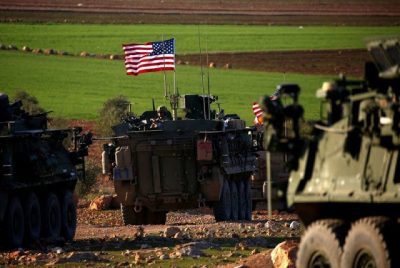Warren and Khanna Demand Probe into Undercounting of Civilians Killed by US Military

All Global Research articles can be read in 51 languages by activating the “Translate Website” drop down menu on the top banner of our home page (Desktop version).
Visit and follow us on Instagram at @crg_globalresearch.
***
“We need to openly consider all the costs, benefits, and consequences of military action,” said the two Democratic lawmakers, “and that includes doing everything we can to prevent and respond to civilian harm.”
Sen. Elizabeth Warren on Tuesday called on the U.S. Department of Defense to review “significant discrepancies in civilian casualty counts,” a month after the Pentagon released its annual report on civilian deaths and injuries as a result of U.S. operations in Iraq, Afghanistan, Syria, Yemen, Nigeria, and Somalia.
The Massachusetts Democrat spoke out on social media days after joining Rep. Ro Khanna (D-Calif.) in writing (pdf) to Defense Secretary Lloyd Austin III regarding the annual report.
The Pentagon stated in its “Annual Report on Civilian Casualties In Connection With United States Military Operations in 2020” (pdf) findingthat there were “approximately 23 civilians killed and approximately 10 civilians injured” in U.S. military actions last year—numbers which did not match the findings of independent outside researchers including Airwars and Brown University’s Costs of War Project.
“Sources say the real number [of casualties] is almost five times higher,” than the Pentagon reported, said Warren. “Protecting civilians must be a priority—Rep. Khanna and I want Secretary Austin to investigate.”
The @DeptofDefense reported 23 civilian deaths and 10 injuries from US military operations last year, but sources say the real number is almost 5 times higher. Protecting civilians must be a priority – @RepRoKhanna and I want @SecDef Austin to investigate. https://t.co/BEZpz5ECmE
— Elizabeth Warren (@SenWarren) July 6, 2021
In their letter, Khanna and Warren cited research from Airwars, a U.K.-based monitoring group run by journalists and international conflict researchers, which reported at least 34 civilian deaths caused by U.S.-led attacks last year in Iraq and Syria alone. The groups also counted between seven and 13 civilian deaths in Somalia.
“The minimum public estimate of civilian deaths caused by U.S. forces during 2020 across five conflict nations was 102 fatalities,” said Airwars in its own annual report last month.
As Common Dreams reported, Airwars and the Costs of War Project found an even greater discrepancy in the Pentagon’s official tally last year after the DoD claimed responsibility for 132 civilian deaths, compared to 1,100 reported by the two groups in Iraq, Afghanistan, and Syria.
This year, the Pentagon claimed responsibility for 20 deaths and five injuries in Afghanistan, but as Airwars reported, the United Nations Mission in Afghanistan (UNAMA) “attributed 120 civilian casualties (89 killed and 31 injured) to international military forces.”
Warren and Khanna called on Austin “to ensure that U.S. military investigations into civilian casualties give greater weight to external sources of information rather than relying solely on its own internal records and sources when assessing third party reports of civilian harm.”
“Using the same sources of information that were used to plan the strike or raid and to verify its results without seeking information from witnesses or survivors of attacks or by visiting the site of strikes cannot give a clear and accurate account of the civilian casualties,” they wrote.
The lawmakers also questioned the DoD’s approach to officially expressing condolences to the families of victims of U.S. military operations—which the Pentagon’s report suggested officials had not done last year.
Despite the allocation of $3 million for payments to grieving families, Warren and Khanna noted, the Pentagon report “said the department offered zero ex gratia payments in 2020.”
“This is despite repeated authorization and funding from Congress, the congressionally mandated development of a new interim policy on ex gratia, and the large number of cases over many years where the department has confirmed civilian casualties and has a means of contacting survivors,” they wrote. “It’s especially striking this year, given that the DoD could have used its $3 million allocation to offer ex gratia to every single civilian confirmed harmed in 2020, with significant funding to spare.”
Warren and Khanna called on Austin to put into practice the measures proposed in the two Democrats’ bicameral legislation, the Protection of Civilians in Military Operations Act, which they introduced in June 2020, including:
- requiring U.S. military commanders to select an officer from outside their unit or chain of command to conduct an investigation into civilian casualties arising from that unit’s or command’s military operations;
- establishing a publicly accessible database for all DoD reports of investigations into the civilian casualties resulting from U.S. military operations, and the results of such investigations; and
- requiring each commander of a geographic combatant command to establish an uninterrupted line of communication between his or her command and the Chief of Mission in order to field and coordinate reports of civilian casualties resulting from U.S. military operations.
“We need to openly consider all the costs, benefits, and consequences of military action, and that includes doing everything we can to prevent and respond to civilian harm,” said the lawmakers. “Strengthening investigations, accurately and transparently reporting on civilian harm, expressing condolences for harm when it happens, and learning from these incidents to prevent harm in the future are all essential steps that reinforce the importance of protecting civilians as a national security priority and as a moral and ethical imperative.”
From Common Dreams: Our work is licensed under Creative Commons (CC BY-NC-ND 3.0). Feel free to republish and share widely.
*
Note to readers: Please click the share buttons above or below. Follow us on Instagram, @crg_globalresearch. Forward this article to your email lists. Crosspost on your blog site, internet forums. etc.

